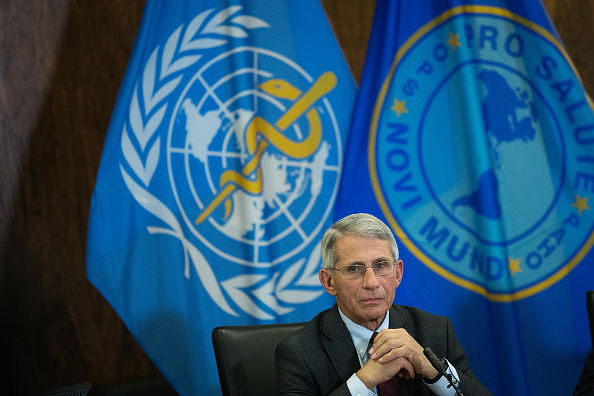Dr. Anthony Fauci, who became the face of the Trump administration’s response to COVID-19 during the early stages of the pandemic, declared it has been “liberating” to work for newly inaugurated President Joe Biden.
Fauci, 80, joined the National Institutes of Health in 1968, becoming director of the National Institute for Allergy and Infectious Diseases (NIAID) in 1984. Over the decades, Fauci dealt with other pandemics and even collaborated with China’s Wuhan Institute of Virology. Any plans he may have had for retirement were put on hold when he was asked to become the Biden administration’s chief medical advisor and contributor to the White House’s COVID-19 response team.
Trump Sours on Fauci
Fauci lost little time in distancing himself from former President Trump. In a Jan. 24 interview with the New York Times, Fauci complained that he had been largely ignored by the Trump administration for the first three years of its term and wasn’t regularly invited to the White House until the pandemic emerged. Even after Fauci became a regular fixture at White House press briefings, he claimed that Trump tried to minimize the seriousness of the pandemic during Oval Office meetings.
But Fauci himself had downplayed the coronavirus in the wake of the first reports that the disease was ravaging China, saying on January 21 last year it “is not a major threat for the people of the United States and this is not something the citizens of the United States right now should be worried about.”
Few of Trump’s pandemic decisions were as controversial as his January 31, 2020 imposition of a travel ban from China. Fauci later credited the action with saving American lives. But, according to one White House insider, Fauci vehemently opposed the move at the time. In an interview with the New York Post’s Miranda Devine, former Trump trade advisor Peter Navarro said of Fauci: “He was adamantly opposed to the travel ban. All he kept saying was travel restrictions don’t work.”
Fauci’s contradictory statements led to his falling out of favor with the Trump White House. Trump reportedly wanted to fire him, but Fauci is a federal employee with civil service protection. Another high-profile Trump COVID-19 advisor, Dr. Deborah Birx, announced her retirement from federal service in December but let it be known she would be willing to assist the Biden administration on the virus if asked.
Fresh Start with Biden
In a triumphant return to the White House briefing room the day after Biden was inaugurated, a smiling Fauci declared: “The idea that you can get up here and talk about what you know what the evidence, what the science is and know that’s it, let the science speak. It is somewhat of a liberating feeling.” Fauci also supported Biden’s ambitious plan to have 100 million Americans receive vaccinations during the new president’s first 100 days in office.
Fauci also told NBC News’ TODAY (Jan.25) that wearing two masks would be more effective in keeping respiratory droplets from spreading to other people and provide additional protection to the wearer. Initially, however, Fauci saw no need for masks. As late as March, he told 60 Minutes, “right now in the United States, people should not be walking around with masks.” By June, he had reversed himself, saying “masks work … to prevent you from infecting someone else… but also it can protect you to some degree.”
For his part, President Biden signed executive orders on January 21 that mandated wearing masks on airplanes, trains, busses, and at airports, as well as on federal property. So far, there has been no federal mandate to wear two masks.
Fauci further strengthened his bonds with the new administration by speaking to the World Health Organization (WHO) on January 21. His address came one day after Biden announced the U.S. would rejoin WHO. President Trump withdrew the U.S. from the Geneva-based United Nations organization after WHO said in late January 2020 that COVID-19 could not be transmitted person-to-person. (see Biden Renews Ties with WHO, Despite China Questions).
Higher Salary Than the President
Fauci has been in the bowels of the sprawling federal health-care bureaucracy for over half a century and has turned it into a very lucrative career.
According to Open the Books, which based its findings on federal pay records, Fauci received $3.6 million in compensation between 2010 and 2019. He pocketed $417,608 in 2019, higher than the president’s $400,000 annual salary.
In the view of one medical observer, Fauci’s record at NIAID presaged his performance during COVID-19. “Dr. Fauci has had 40 years to figure out the life-cycle of and effective responses to pandemics and yet treated COVID-19 as if he were caught by surprise,” says Marilyn Singleton, M.D., J.D., an anesthesiologist, and a past president of the Association of American Physicians and Surgeons.
“Did his collaboration with the Wuhan Institute for Virology account for his contradictory responses? Sadly, lives were lost by his refusal to acknowledge positive results in preventing and treating pneumocystis with inexpensive sulfa drugs during the early years of the HIV/AIDS pandemic. It was not ‘scientific,” Singleton told Health Care News. “Today with COVID-19, Dr. Fauci’s adherence to ‘the science’ cost lives as he dismissed safe, effective, inexpensive medications such as hydroxychloroquine and ivermectin. Perhaps with the new administration, he will choose saving lives over the political theater.”
Bonner R. Cohen, Ph.D., (bcohen@nationalcenter.org) is a senior fellow at the National Center for Public Policy Research.






















[…] following morning at 4 a.m., Dr. Anthony Fauci used Zoom in Washington to assure WHO officials in Geneva that the U.S. was looking forward to […]